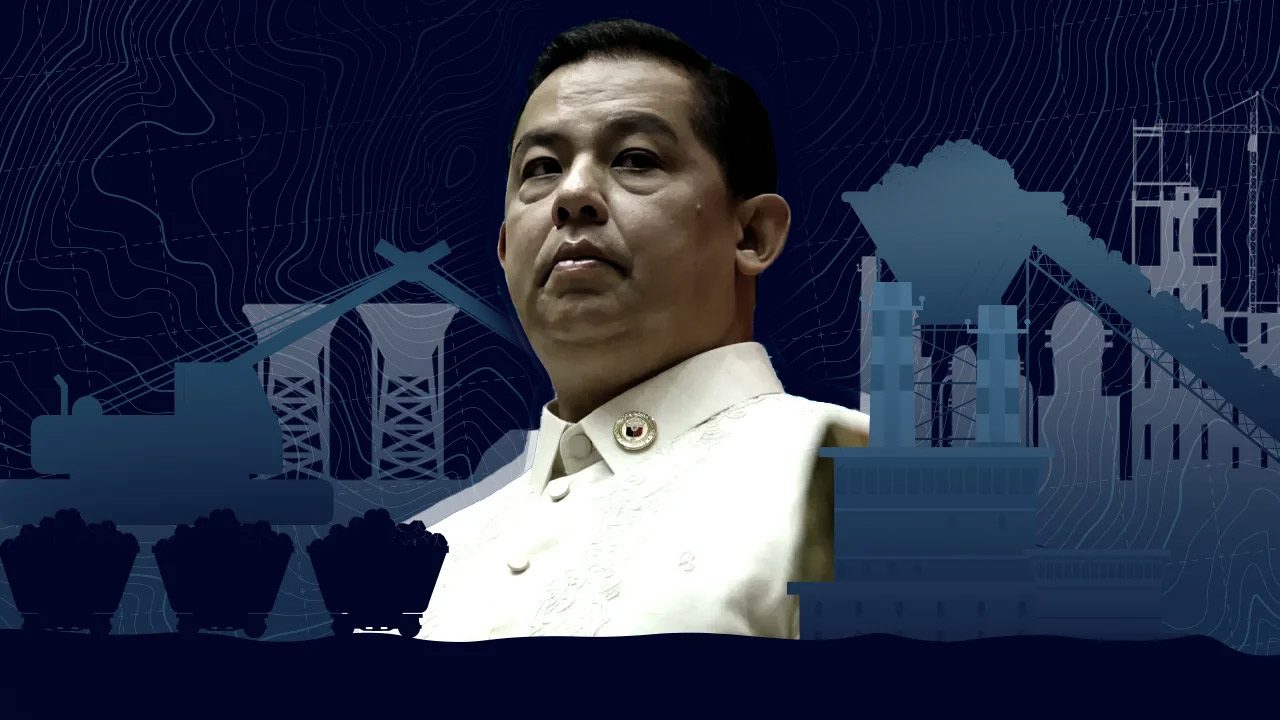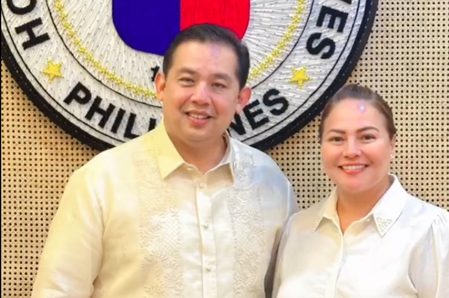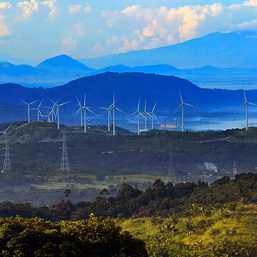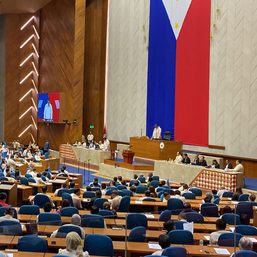SUMMARY
This is AI generated summarization, which may have errors. For context, always refer to the full article.

Last of 2 parts
Part 1 | Mapping the businesses of Speaker Martin Romualdez
AT A GLANCE:
- The Romualdez clan’s wealth can be traced back to deals made by their late patriarch, which critics deemed as clear signs of cronyism during the Marcos dictatorship
- House Speaker Martin Romualdez is supporting a measure that will benefit mining companies under his family’s portfolio
MANILA, Philippines – Just how rich is House Speaker Martin Romualdez?
This was a question that was raised early on in his political career when he gained national attention in 2009 for supposedly paying for a lavish dinner at the upscale Le Cirque for former president Gloria Macapagal-Arroyo and other officials when they were in New York for a working visit to meet then-US president Barack Obama.
News articles said Romualdez allegedly paid $20,000, equivalent to almost P1 million at that time. The timing could not have been more insensitive, given that the nation was mourning the death of former president Corazon Aquino.
Then-press secretary Cerge Remonde confirmed the dinner to columnist Ellen Tordesillas. “Yes, I was there. It was on the invitation of Cong. Martin Romualdez. Malacañang did not pay for it,” Tordesillas said in her blog. In a television interview in 2016, Romualdez denied paying for the dinner.
Back when the House of Representatives was still publishing the net worth of legislators, Romualdez’s wealth was pegged at P474 million, making him the eighth richest congressman in 2015.
One of the few clues about his wealth pointed to his father, the late former ambassador Benjamin “Kokoy” Romualdez, whose net worth was estimated at over P3.3 billion by Forbes. The Presidential Commission on Good Government (PCGG) claimed that his wealth was ill-gotten.
Journalists got an opportunity to ask Romualdez questions about how he got rich when he ran in the 2016 senatorial elections. He didn’t win a seat after placing 15th in the race.
In an interview with broadcast journalist Karen Davila, Romualdez attributed his wealth to his achievements in the private sector.
“Well, I was a lawyer before I became a congressman, I still am. And I was in the corporate world, I was able to rise up the ranks of some corporate boards. I even ended up becoming the chairman of Equitable Banking Corporation and chairman of Benguet Corporation, the oldest mining corporation in the Philippines. We were behind some of the biggest mergers in the country. We were very lucky and fortunate to make the right investments and decisions then,” Romualdez said in an ANC interview in 2016.
When asked about his late father’s net worth and alleged cronyism, Romualdez did not contest the Forbes estimate, but emphasized that cases against his late father have been dismissed by the courts.
“I guess he had some investments as well. I was much younger then, so I didn’t know his business transactions. But that again, there have been cases, and all of these cases involving the PCGG, I think that most of them have already been dismissed, particularly the anti-graft cases. So, the records speak for themselves and I guess Forbes wouldn’t come up with those figures if they were derived from spurious sources,” Romualdez said.
On paper, Romualdez currently has no stake in Benguet Corporation. His two brothers formerly held the highest posts. Philip was former president and CEO, while Daniel was the company’s former chairman.
Martin’s son, 22-year-old Andrew Julian, currently sits as a director of the board. He graduated in 2022 from Cornell University with a degree in international agriculture and rural development.
Rappler reached out to Romualdez’s media relations staff to confirm his and his family’s ties to Benguet Corporation, as well as other mining-linked companies – Bright Kindle and Marcventures. They have acknowledged our requests and follow-ups made on November 28 and December 1, 4, and 6, but we were told that Romualdez has yet to respond. We will update this story once we get a reply.
Benguet Corporation
Benguet Corporation was established in 1903 as Benguet Consolidated Mining Company (BCMC). It was founded by three Americans that mined for gold: Metcalf Clarke, Nelson Peterson, and Henry Clyde.
From mining operations in the Baguio-Itogon district, the company expanded and acquired other mining companies.
By 1965, BCMC, which renamed itself into Benguet Consolidated Incorporated (BCI), was the largest gold producer in the Philippines, accounting for almost half of the total gold production in the country.
The Romualdez family got into the company during the dictatorship of the late president Ferdinand E. Marcos. At that time, legislation limited foreign ownership of mining companies to just 40%.
Benjamin Romualdez, brother of Imelda Marcos, got a substantial stake in BCI after Palm Avenue Realty and Development Corporation and Palm Avenue Holdings slowly acquired BCI shares for him, according to the PCGG.
The anti-graft court Sandiganbayan, however, said in a 2008 ruling that the government failed to “adequately comply” with its order to clarify its allegations that the two Palm companies were conduits to convert public funds to acquire shares. The Sandiganbayan junked the PCGG’s case.
Benguet Corporation currently operates gold mines in Benguet Province, nickel mines in Zambales province, and a limestone production facility in Baguio City.
Its subsidiaries are:
- Benguet Management Corporation
- Arrow Freight and Construction Corporation
- Benguetrade Incorporated
- Benguetcorp Resources Management Corporation
- Keystone Port Logistics and Management Services Corporation
- Benguetcorp Laboratories Incorporated
- Benguetcorp International Limited
Currently, Benguet Corporation got the green light from the Mines and Geosciences Bureau for a gold project in Zamboanga Sibugay province. The project is located around 150 kilometers from Zamboanga City.

Bright Kindle and Marcventures
Romualdez has other mining companies, namely, Marcventures, and a holding company called Bright Kindle Resources and Investments Incorporated (BKR).
BKR is a holding company acquired by Romualdez-owned RYM Business Management Corporation in 2013.
Prior to the acquisition, BKR was formerly Bankard Incorporated, a subsidiary of Rizal Commercial Banking Corporation that was involved in the credit card business. But after it was acquired by RYM, it ceased to be in the credit card business and became a holding company.
To date, BKR has no operating segment other than being a holding company.

BKR was once reported to have been considered for acquisition by casino-hotel firm Okada Manila for purposes of a backdoor listing. Both companies denied the news reports.
BKR has a 100% stake in Bright Star Resources and Development (BHD), a mining company that was created only in 2022 with an authorized capital of P150 million. BKR also holds 19.9% of Marcventures.
BKR has been described by many stock market observers as a somewhat dormant company, up until the Marcos Jr. presidency. Most recently, or in September 2023, its board of directors suddenly approved a property dividend worth around P50 million, where BKR shareholders were entitled to have 1 BHD share for every 3 BKR shares owned. It also declared cash dividends of approximately 12% of the property dividend’s value.
When the dividends were announced, popular stock market newsletter Merkado Barkada quipped, “What took you so long?”
“BKR is the epitome of a crony stock, so I’m morbidly curious to see for what purpose this sleeping dog has been shaken from its slumber,” it added.
Marcventures, formerly AJO.net Holdings Incorporated, was set up in 1957. It changed its name to its present one in 2010, as it changed its business to include land ownership.
Its subsidiary, Marcventures Mining and Development Corporation (MMDC), holds a mineral production sharing agreement covering 4,799 hectares in Cantilan, Surigao del Sur.
It is involved in extracting, mining, smelting, refining and converting mineral ores like nickel, chromites, copper, gold, manganese and other similar ores.
MMDC’s main product is nickel ore. All its nickel ore productions were exported to China.
In 2017, it merged with Asia Pilot Mining Philippines Corporation and BrightGreen Resources Holdings, with Marcventures as the surviving entity. The merger gave Marcventures the claims to three more mining areas in Samar and Surigao del Sur.
Its other subsidiaries are:
- BrightGreen Resources Corporation
- Alumina Mining Philippines Incorporated
- Bauxite Resources Incorporated
Romualdez’s son, Andrew Julian, sits as a director of the company, too.
Lowering mining taxes
Environmental groups have expressed concern over Romualdez's possible conflict of interest.
The Marcos administration is currently pushing for the rationalization of the mining fiscal regime.
The House of Representatives approved House Bill 8937 or an Act Enhancing the Fiscal Regime for the Mining Industry last September 26. The bill seeks to impose a 4% royalty on the gross output of mining operations within mining reservations – a decline from the current 5%.
Mining reservation areas are sites that the government had identified as economically viable and mineral rich. There are currently nine mining reservation areas in the Philippines.
Despite its speedy passage, the bill was criticized for supposedly reducing taxes for mining companies.
“Akala ko ba the concern of the government was to raise revenue?” Cielo Magno, an economics professor at the University of the Philippines Diliman and a former undersecretary in the Department of Finance, earlier told Rappler in an interview. (I thought the concern of the government was to raise revenue?)
“Why are we lowering taxes for these companies when they’re already paying 5%?”
Aside from revenue concerns, the mining fiscal regime bill is being proposed in the face of a growing demand for more minerals to supply the needs of countries transitioning to clean technologies.
At present, the government gets 5% royalty from the gross output of companies operating in mining reservations. Those within ancestral domains give 1% of their gross output to the government. Those outside mineral reservation areas do not pay royalties.
Here are the salient features of HB 8937:
- Lowers royalty rate of mining operations within mining reservations from 5% to 4%
- Imposes profit-based royalty for mining operations outside mining reservations; the current fiscal regime does not levy taxes for operations outside mining reservations
- Subjects companies to a windfall profits tax
- Subjects small-scale mining operations with a royalty rate equivalent to one-tenth of 1% of gross minerals output
- Does not impose export tax
“No less than the Chamber of Mines of the Philippines has expressed support for the measure as it went through the legislative process in the House. I agree with the chamber that the fiscal changes being introduced by this bill will help the country’s post-pandemic economic recovery,” Romualdez said when the bill was passed at the House of Representatives. – Rappler.com
Add a comment
How does this make you feel?












There are no comments yet. Add your comment to start the conversation.